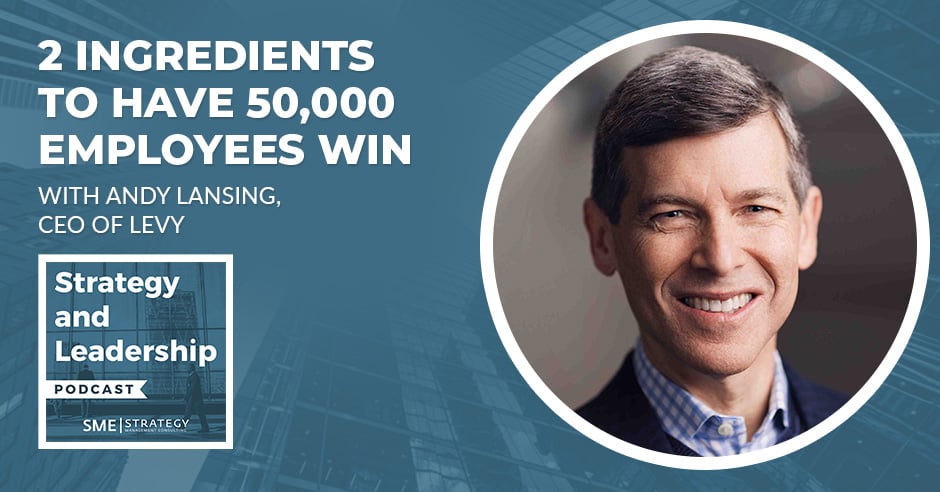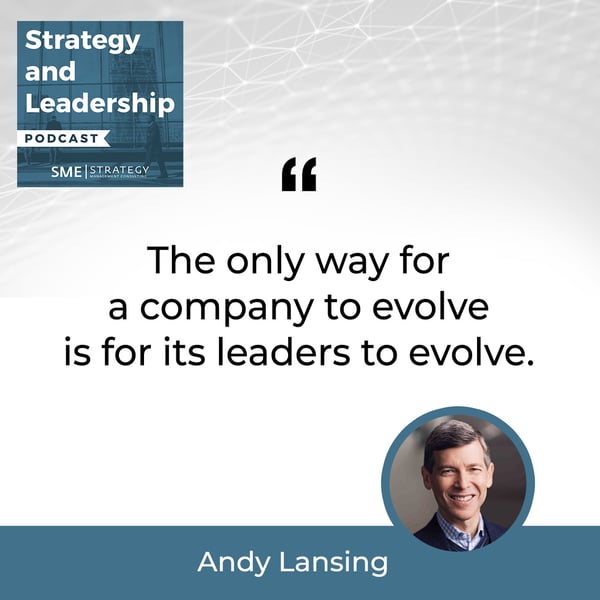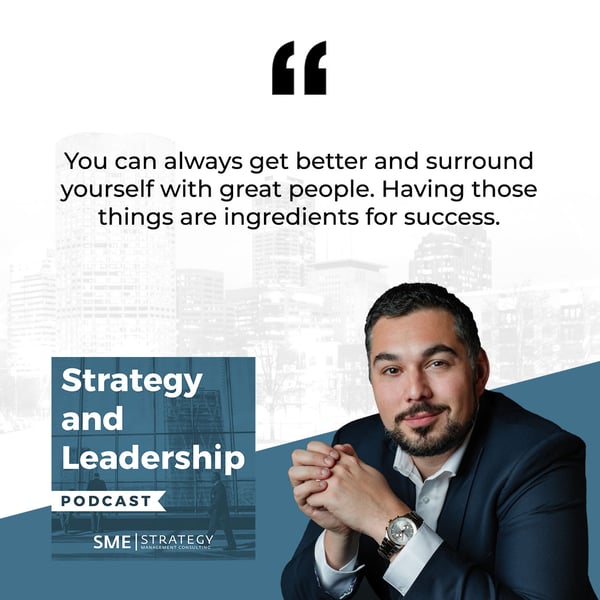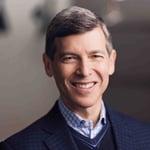2 Ingredients To Have 50,000 Employees Win With Andy Lansing, CEO Of Levy

Business success is unachievable without the right people at your side and a healthy workplace culture where they can thrive. Therefore, leaders must know how to surround themselves with talented individuals and put into action the values they hold dear. Anthony Taylor chats with Andy Lansing, CEO of Levy, who shares the extraordinary journey of growing his company from just a single delicatessen to a team of more than 50,000 people. Andy talks about the immense power of niceness and passion in targeting huge business wins. He also breaks down leadership lessons from his entire career, from creating a workplace culture where failure is embraced as a stepping stone to success and why innovation must always start from the top.
Listen on Spotify: https://open.spotify.com/episode/7eHAMwZOqTJm1wWBviDWPc?si=9bc89f56ad004de1
Listen on Apple Podcasts: https://podcasts.apple.com/ca/podcast/2-ingredients-to-have-50-000-employees-win-with-andy/id1202449526?i=1000631073545
---
Watch the episode here
Listen to the podcast here
2 Ingredients To Have 50,000 Employees Win With Andy Lansing, CEO Of Levy
In this episode, my guest is Andy Lansing, who is the CEO of Levy. Andy, how are you?
I'm good, Anthony. It’s nice to see you and be with you.
I'm so excited. I just found out you have your own secret podcast, which I can't tell anybody about, but it speaks to how cool and impactful your organization is. If you folks reading haven't heard of Levy Restaurants, you might know them through other ways. Andy, why don't you tell our readers who you are and we'll get into the interview?
It’s a long story to tell and I'm not going to tell the whole thing because we don't have time. We are a restaurant company based in Chicago and there are two primary areas of our business. One is restaurants. We own and operate restaurants throughout the country. The other part of our business, which is even bigger, is our sports and entertainment group that operates the food service at virtually every iconic building in the country, some throughout the world, events from Grammys, Kentucky Derby, Coachella, the Dodger Stadium, Wrigley Field, NBA, NASCAR, tennis, golf, convention centers, you name it. We like to say we bring restaurant-quality food to places where people least expect it. People probably have experienced us at some point in their journey.
If memory serves, you started from one single delicatessen to now 50,000-ish employees or something like that.
.png?width=600&height=600&name=Graphics%20-%20EB%20-%20SALP%20Andy%20Lansing%20(1).png)
We started as one delicatessen in Chicago. Our story is a happy coincidence of luck and maybe a little strategy, but we got into this business totally by accident.
Was it opportunity meets preparedness when you get real good luck? In addition to hard work and all of that stuff, your organization has been extremely innovative in the work that they do. Before I get into the nuts and bolts of the organization, take it back. What has your CEO journey been like for you? How's that going so far?
It's been great. I loved it. I've been at this company for many years and I'm living proof of one of the greatest sayings that I know of that I quote every day, which was a line from a John Lennon song. “Life is what happens when you're busy making plans.” In my case, nothing could be truer. The last thing I thought I was going to be in was the restaurant business, and yet here I am. The journey has been incredibly exciting. I feel like I got the greatest job in the world because I work around food and sports. I can't imagine things getting much better than that.
Life is what happens to you when you are too busy making plans.
That sounds like a pretty good job to me. Let me ask, many years as a CEO scaling from one deli to what you're working on now, what are some of the defining moments in the organization? You get there, and then in the spirit of leadership, how did you evolve as an individual to make those opportunities into what they are now?
There were a couple of defining moments in our company's history. The first was after we had operated a few restaurants in Chicago, we got into the sports entertainment business totally by accident. The White Sox were building the first skyboxes in the old Comiskey Park. They had this idea that if they had a restaurant company cater the food and the skyboxes, they could sell them better rather than having the hotdog and beer guys trying to do the high-end.
They came to us and said, “Would you cater the skyboxes from your restaurants?” We said, “No. We're not caterers. We're restaurateurs.” They literally asked us five times and finally we said yes for all the wrong reasons. “Maybe they'd be good someday. We'd get tickets to the World Series” so we tried it. We got into it, and what we realized pretty quickly was the restaurant business that we were in was the hardest business in the world. You're only as good as your last meal. People come in with expectations way high and you try to hit them or exceed them.
What dawned on us is people historically came into stadiums and arenas with expectations way down here. If we brought the restaurateur mentality in, the training, the food, and the approach, people went nuts. They were expecting hotdogs and beer. We were giving them crab cake and tenderloins served by nice people. It took off. Once we realized that and people started taking notice, it was a pivotal moment because we had a tiger by the tail and we were like, “Let's go with this thing.” We decided to expand.
I would say the other defining moment for us was around the year 2000. We went through what so many companies go through, which is what do we want to be when we grow up? Do we want to go public? Do we want to sell? Do we want to buy? All these companies were approaching us saying, “We want to buy you.” We said, “We're not for sale.” We went down the IPO route for a little bit, but that didn't feel right because we didn't want to live our lives that way.
Finally, we met the Compass Group based out of the UK. They're the largest contract food service company in the world and they said, “We want to buy you.” We said, “We don't want to sell.” They said, “What kind of deal would you do with us? We love what you're doing and we want to bet the jockeys. You guys are amazing. We think you have the greatest future in the world. We want to put our horsepower behind you.”
We struck a deal with them where we sold 49% of the company to them in 2000 and said, “If you are true to what you say you are, which is to leave us alone, not spoil who we are, we'll sell the rest to you down the road, but you got to prove it to us.” From day one, they did. They were the most supportive. We continue to be partners. When we met them, we had $200 million in revenue back in 2000. This year, we'll knock on the door of $3 billion to $3.2 billion in revenue. It's been a great story and that was a pivotal moment for us as we were trying to figure out who we wanted to be.
How do you do that? As a CEO of an organization, as an individual, as a leadership team, what do you do to stick to your guns like that? It sounds like there are 2 or 3 and I'm sure dozens, probably hundreds of those moments where you needed to stick to your roots. In some cases, you deviated and you found an opportunity. In others, you said, “Absolutely not.” How do you incorporate that connectedness to your mission into the work that you do?
Many companies zigzag. They claim that they have the greatest culture in the world. Maybe they'll put a poster on the wall with some fancy words, but every year, it's the flavor of the year. They zig, they zag, and they change who they are. We've never changed who we are. We have always said we are a family business. We're a big family, but we're family.
Here are the two most important things at Levy that other companies don't talk about, and it's not right for every other company. It was two words, nice and passion. If you give me someone who is a nice human being and who is passionate about this business, it is the magic elixir for success at Levy. I don't care where they went to school. I don't care if they went to school. I don't care if they grew up in the hospitality business. You give me someone with those two traits and that has never wavered over decades.
Getting a nice human being with a deep passion for your business is a magical elixir for success.
Everybody knows. You can be the most talented guy in the world, but if you're not a nice human being, this is the wrong company for you. You'd be the nicest person in the world, but if you don't have a fire in the belly, it's the wrong place. We knew that was the most important thing as well as old-fashioned hospitality. It’s never forgetting that we want to treat people like they're guests in our home. Above all else, the food has to taste good or people aren't going to buy it. We stuck to our guns as opposed to companies that I don't think are comfortable sticking to their guns.
I get that. What I love about it is it is simple. People come up with value statements that sound good but don't mean anything at the end of it, but you're like, “What are the values that we want?” One of the things I appreciate about Midwest folks or something like that is the Midwest niceness. Sometimes you can be overly nice and we won't go there. It’s Minnesota nice, but not Illinois nice.
I find it interesting and you're saying, “This is how you're going to win.” It is like any great organization and sports organization. You need to have the right people with the right mentality so you can win. Before I forget, I was at this box at LA or Dodger Stadium, the food was primo. If you're responsible for that, thank you very much.
We are responsible and I'm glad to hear that. Anthony, the other thing that I would quickly add is this. I think this goes without saying. You asked me what kind of leadership lessons or what's the key. Again, there are a million books out there. Most of which are worthless. At the end of the day, it's about surrounding yourself with great people, giving them what they need, and getting out of their way. If you want to truly define the best leaders, look at who they surround themselves with.
My vision in life, which could never happen, is if I was interviewing for the highest level position in this company, I would love not to interview that person. I would love to spend time in a room full of all the people who report to that person. I could tell you with 100% accuracy whether that's a good leader who I haven't even met yet. I'm smart enough to surround myself with people who make me feel like an idiot every day and do a great job of that.
I do appreciate your approach to the team, but I also can tell from how you talk about things that you care about as well. You care about the product, people, and reputation. You care about what you're doing. When you eat, you taste food that has love in it and you taste food that doesn’t. If you have those ingredients, it's the key to success but I do have another question.
You've been able to stick to your guns. You've been able to drive your mission and do all of that work, but simultaneously, you've been able to lead a lot of firsts. You've been able to innovate. You've been able to do new things. Would you say that's likely a byproduct of the people, but how do you foster an innovation culture in your organization to do new things in food, to do new things in hospitality, and to do new things in technology?
It has to start with me and me encouraging people. “Let's go. Let's try. We're not going to be successful at everything. I'm okay with failing. Let's fail quickly. Let's fail cheaply.” We have the world's greatest Petri dish in terms of places to try things. We're everywhere. If you want to try something at a few NFL stadiums, a few MLB, a tennis tournament, or a horserace, we've got the places. I encourage our folks and they know I want to try.
If we're successful on 4 of 50 initiatives, I'm totally good with that. It’s because of one thing, for better or worse, and I know this is supposed to be very flattering. We are copied in this industry. When we do something, you can count one of our competitors is going to do it. I suppose I should be flattered. It pisses me off and motivates me to keep going faster and keep getting our people to go faster. It's a culture. You can't say to people, “Be innovative,” and then swat them if they fail. You have to also say good ideas come from everywhere, from dishwashers in locations and servers who know what it's like. It's a culture, but it has to start with me.
As we finished up, we talked about a lot of historical learning and growth, the fact that you've put great people around you, and the fact that you've created a culture of acceptable failure. In baseball, if you're batting 300, you're one of the best baseball players. Including that, if we take your own personal development as a CEO of a $3 billion business, what are you taking on in your own growth and development? Is there anything or challenges that you haven't quite mastered yet with where you sit?
I don't think I've mastered anything yet. I mean that as the truth. The one thing I say to everybody around here is a healthy company keeps evolving. We've managed to disrupt our industry a couple of times and others don't disrupt it ever. We've managed to disrupt it a couple of times with things we've done. The only way for a company to evolve is obviously for its leaders to evolve.

We all have to keep evolving. I'm a different leader than I was many years ago, and I'll be a different leader in a year from now. You learn and you get more experience. You get more seasoning. You marinate a little longer. You realize that certain things matter and certain things don't. I suppose when I started in this business, some would say I was more black and white than I am now.
There's one way and another way. Now, as you know, there are so many shades of gray in almost every decision. It's being self-effacing and realizing you don't have all the answers. You can be a moron and admit you're a moron. People respond to that when you have it that way. I'm evolving, Anthony. I'm not even close to there yet.
I love that and I reflect on that as like the sports that we all love. I look at basketball as an example. The game of basketball has shifted from what it was in the '80s with the big bruisers to now you have 7-foot guys shooting three-pointers and who knows what's coming up next. Watching the US play against Japan, Japan was every sport that evolved.
Not only do you need to evolve internally, you need to evolve externally. All I can say is I look forward to the next meal that I eat from the Levy Restaurant, whether I know it or not. Andy, thank you for taking the time. Where can people connect with you? Where can they learn more about your work and how can they find out more if they want to partner with you in any shape or form?
That's nice of you to say. We're everywhere. We are at LevyRestaurants.com. We're on Instagram, LinkedIn, Facebook, and all the social media. It's not hard to find us at all. We love hearing from people. We love hearing new ideas, people who want to join our team, or partners who want to work with us. One thing I can say is people who reach out to me or us, they're going to hear back. We love it. We love being engaged.
Andy, thank you so much for being here. It's been a personal and professional pleasure. I wish you and everybody on your team nothing but the best of success.
Thanks, Anthony. It’s good to be with you.
Our guest in this episode is Andy Lansing, the CEO of Levy. One of the things that I take away from this conversation is you can always get better. You can always surround yourself with great people and a great team. Having those ingredients for success makes a good dish. Folks, thanks for being here. Thanks for reading. I appreciate who you are and I'll see you next episode.

Important Links
- LevyRestaurants.com
- Instagram - Levy Restaurants
- LinkedIn - Levy Restaurants
- Facebook - Levy Restaurants
- SME Strategy- Strategic Planning Facilitation Services
About Andy Lansing

Andy Lansing is the Chief Executive Officer of Levy, an innovative and award-winning company specializing in restaurants and premium sports and entertainment dining and retail. Under his leadership, Levy has grown to over 50,000 team members delivering signature hospitality to guests at over 300 locations in North America and around the world. Levy is recognized for its innovation in sports from Fast Company, and as one of America’s Best Employers and Best Employers for Diversity and for Women by Forbes. Nation’s Restaurant News also recognized Andy on its list of the most influential CEOs in the hospitality industry in 2020 and 2021.
He began his career with Levy in 1988 and in 2004 took on his current role as Chief Executive Officer. Under Andy’s leadership, Levy has continuously evolved its business to create industry-leading, frictionless experiences for its guests, including the launch of E15, that has set an industry standard for data-driven experiences and its innovation studio, DBK Studio, to support the next generation of technologies across Levy venues. Levy also expanded into retail under Andy’s guidance, bringing its signature commitment to its Rank + Rally retail brand.


